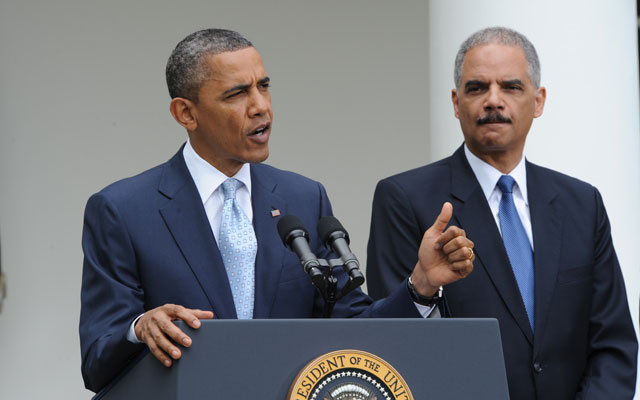Well, there he goes again! President Obama has, once again, taken unilateral action by announcing a new clemency initiative. The Department of Justice, which reviews applications for pardons and clemency and makes recommendations to the president, said that it will “prioritize” clemency applications for inmates who meet certain criteria. The Bureau of Prisons will notify inmates about this initiative, and DOJ is contemplating using dozens of new attorneys to deal with the hundreds, if not thousands, of applications it will likely receive.
Unlike many past unilateral actions that this administration has taken, the President has clear and broad authority under the Constitution “to grant Reprieves and Pardons for Offences against the United States, except in Cases of Impeachment.” With this new initiative, the President would not unilaterally alter a law; rather, he would pardon or reduce the sentences of people who have violated the law.
Throughout our nation’s history, presidents have granted pardons, which effectively expunge a federal conviction, and clemency, which maintains the conviction but reduces the offender’s sentence, to people who have unquestionably violated the law. Some presidents have used their pardon power wisely and in an appropriate manner, while others have not (President Clinton’s pardon of Marc Rich comes to mind). It remains to be seen how President Obama will exercise that power here.
Two of the criteria that DOJ says it will use are (1) people who have served at least 10 years; and, (2) those who “by operation of law, likely would have received a substantially lower sentence if convicted of the same offense(s) today.” This is presumably a reference to crack cocaine dealers who were sentenced to lengthy mandatory minimum sentences before passage of the Fair Sentencing Act of 2010. This law reduced the disparity between the amount of crack cocaine and powder cocaine needed to trigger mandatory minimum penalties from a weight ratio of 100:1 to 18:1 but did so only prospectively. In other words, there are some street level crack cocaine dealers who were subjected to five-year mandatory sentences who would not be subject to this minimum penalty today; some who received 10-year mandatory sentences who today would be subject to only five-year minimum sentences, and some who received 20-year sentences who today would be subject to 10-year mandatory sentences.
Recently, the Senate Judiciary Committee passed the Smarter Sentencing Act of 2014 by a 13–5 vote, with Sens. Mike Lee (R–Utah) (a former federal prosecutor and a co-sponsor of the bill), Ted Cruz (R–Texas), and Jeff Flake (R–Ariz.) voting in favor. This is a tough vote for conservatives. While some conservative organizations oppose the Smarter Sentencing Act, others support the bill. Section 3 would enable offenders sentenced under the old 100:1 regime to petition the sentencing court for a reduction in sentence, which the court could grant or deny using, no doubt, many of the same criteria DOJ says it will use. This would certainly accomplish some, if not most, of what the president claims he is seeking to accomplish through his clemency initiative.
As influential conservative commentator Charles Krauthammer stated, “If it were just this alone, you would say yes. On the merits it’s not a bad idea, there was over-sentencing in the past.” Yet, Krauthammer decries the president’s initiative and his overweening go-it-alone proclivities.
Although the president frequently says that he wants to proceed in a bipartisan fashion, he never seems to miss an opportunity to politicize an issue, especially, as some have suggested, if he thinks it will help his party in the next election. Maybe the clemency initiative will help his party; maybe it won’t. One thing that seems clear, though, is that by taking this precipitous action, the president has once more decreased the likelihood that a true bipartisan solution will emerge that would address a serious social issue.
